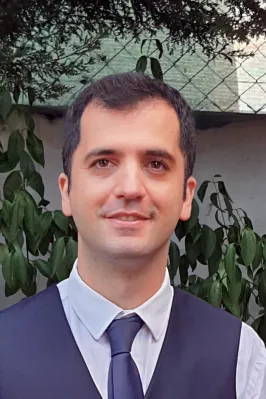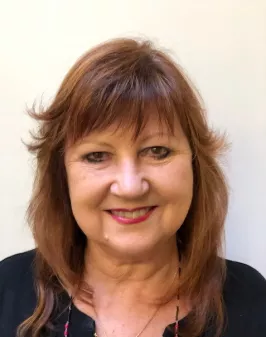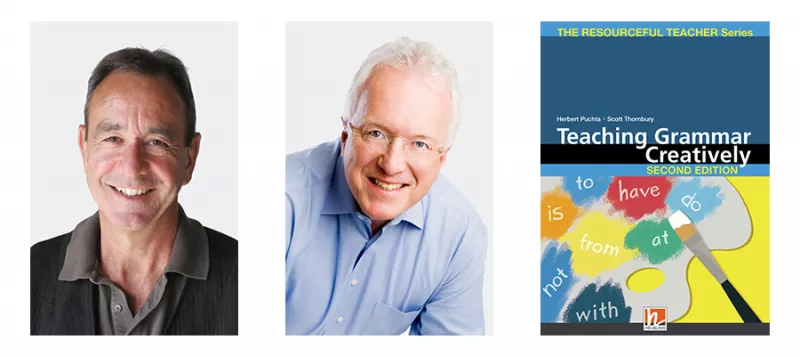ELT webinars | Archive
Enjoy a recording of previous Helbling English Webinars.

Chris Jory
Get ready for the world! How to develop life skills in the English language classroom.
What does it mean to be ‘real-world ready’? What are the key life skills that our teenage learners need to develop in readiness for the sometimes challenging everyday scenarios that they will encounter in their lives beyond school? In this session, we’ll look at the most important ‘soft skills’, including in the areas of self-awareness and self-expression, interpersonal communication, and other ‘21st-century’ skills such as creativity, collaboration and critical thinking. Using examples from Options, the new lower secondary course from HELBLING, we’ll look at why these soft skills are so important and how we can develop them in the English language classroom in ways that are simple, practical and effective.
Thursday 27 March 2025

Thomas Strasser
All Access AI - because there's more than ChatGPT!
This interactive online workshop for ELT teachers will focus on digital tools and AI for their aiding lesson preparation. In this session, we will help you explore the latest digital tools and AI-powered solutions that can help you prepare for EFL-lessons more effectively. This workshop will be filled with interactive tasks and creative ideas designed to keep you engaged and motivated throughout. During the workshop, we will cover a range of topics, including:
- Updated tools and activities
- The benefits of using digital tools and AI
- How to identify the best tools for your needs (and your learners)
- Strategies for using AI-powered tools to improve your learners’ performance
Thursday 27 February 2025

Chaz Pugliese
Helping our students regain their ability to focus.
Attention and focus are key in any learning endeavor, we all know that. We also know that in this tech-riddled world, attention has become a scarce resource. We multitask too much, we let ourselves get distracted too often too easily, our capacity to focus has greatly diminished over the last 20 years or so. Can this be changed? There’s clearly no silver bullet solution to this status quo, but there’s definitely hope! In this session I will suggest a few practical, road-tested ideas that may help your students take control of their distractions, gain a sense of agency and redirect their attention.
Thursday 30 January 2025

Nóra Wünsch-Nagy
Reading with young learners – Engage the imagination and boost language learning with story-based reading programmes.
Storytelling is a powerhouse for young learners. Not only does it provide language use in context, but it also engages learners emotionally and supports their critical reasoning and social understanding. The Helbling Young Readers and The Thinking Train series achieve this by combining a variety of resources for learning: language, images, individual and group activities, audio and digital content with hands-on creative projects.
In this webinar, we will first look at how all these elements can be actively used in reading sessions. Then, we will discuss different ways of integrating reading into classroom work from short projects to story-based programmes.
Thursday 21 November 2024
Griselda Beacon
Rediscovering the power of storytelling in primary English classrooms
In this session, we will discuss the relevance of storytelling in the English language primary classroom as a wholesome activity which allows young learners to undergo a comprehensive language learning experience. We will introduce a pedagogical framework which fosters techniques and strategies to explore and exploit storytelling in the primary classroom, and we will provide concrete examples from HELBLING’s newest coursebook MARBLES and The Thinking Train Readers, to help you in your creative lesson planning.
Griselda Beacon is a teacher educator and specializes in literature, creativity & art in English and holds an MA in Literature and Foreign Language Teaching from Philipps-Universität Marburg, Germany. She has been working in the field of teacher education and Primary curriculum development for over 20 years, sharing her experience as an in-service teacher trainer and curriculum developer in Latin America, Europe, Africa & Asia.
Thursday 14 November 2024

Mariano Quinterno
Social issues in focus for developing critical citizenship in English language education
Our complex societies demand citizens who can both critically reflect on current social concerns and take collective action to solve global, regional or local problems. In this presentation, we will first explore some situated pedagogical practices that aim to develop critical citizenship in the language class. We will then offer some sample tasks, using examples from HELBLING's new course book for teenagers: Options, which seek to problematize social issues and promote democratic dialogue, focusing on the UN's Sustainable Development Goals (SDGs), in an attempt to construct a more equitable society for all.
Mariano Quinterno holds an M.A. in Applied Linguistics (Teaching of English as a Foreign Language), Universidad de Jaén, Spain and is currently pursuing his Ph.D. in Education. He is a lecturer in Language at Instituto Nacional Superior del Profesorado Técnico, Universidad Tecnológica Nacional. He teaches American Literature at Instituto Superior del Profesorado “Dr. Joaquin V. Gonzalez.” and is a tenured teacher at Colegio Nacional de Buenos Aires. He has lectured on ELT methodology across South America, Canada and Spain, specializing in working with teens and young adults.
Thursday 24 October 2024

Thomas Strasser
All Access AI. Your updated ELT toolkit – because there's more than ChatGPT!
This interactive online workshop for ELT teachers will focus on digital tools and AI for their aiding lesson preparation. In this session, we will help you explore the latest digital tools and AI-powered solutions that can help you prepare for EFL-lessons more effectively. This workshop will be filled with interactive tasks and creative ideas designed to keep you engaged and motivated throughout.
During the workshop, we will cover a range of topics, including:
- The benefits of using digital tools and AI
- How to identify the best tools for your needs (and your learners)
- Strategies for using AI-powered tools to improve your learners’ performance
Thursday 17 October 2024

Chris Jory
Assessment as a learning tool – a range of practical options.
How and when do we assess our learners? And more importantly, why? As Carol Ann Tomlinson (the doyen of differentiated teaching) says, “Assessment is today’s means of modifying tomorrow’s instruction.” In other words, it gives us the means to adapt and differentiate teaching and learning so that it remains relevant and appropriate to learners’ evolving needs.
In this session, we’ll look at the role of assessment in language learning, not simply as a measure of competence but also as a powerful tool for making learning more personalised, boosting motivation and improving learning outcomes for every student. We’ll explore practical and time-saving tools that make effective ‘assessment for learning’ possible, both inside and outside the classroom, including through the use of innovative and easy-to-use digital tools.
Thursday 19 September 2024

Nóra Wünsch-Nagy
Make Reading Matter: support social and emotional development in young learners through stories.
In this webinar, you are going to learn about using stories for multiple purposes in the young-learner classroom. Stories are the most natural way of learning for children, and becoming familiar with the amazing potential of picture books will help you harness their magical powers. We will use examples from the Helbling Young Readers and The Thinking Train series to illustrate these goals and present you activities you can try in your young learner classes. By helping our students to develop their visual and literacy skills, we give them the tools to recognise and address their emotions and relate to others in social contexts. With their social and emotional development in mind, we will look at five different classroom goals and see how stories will help you work towards them.
Thursday 16 May 2024
Herbert Puchta
Mixing the serious with the fun: developing language and life skills with young teenagers.
Lower secondary students are ‘tweenagers’ – no longer children, but not yet young adults. Serious and interested in real-world issues on the one hand, and playful and childlike on the other. The latest findings from educational research and cognitive psychology show how important the content of our teaching is if we want to reassure tweenagers that we take them seriously for who they are. If we can do this, we will be able to build rapport with them and develop a classroom culture that they want to belong to. This will increase their motivation to learn, get them to take us and their studies seriously, lead to better language learning, and more fun – for our learners and for us as teachers.
Tuesday 7 May 2024

Gavin Biggs
Mystery and adventure in class: how stories can inspire students.
Understanding the function of stories is essential in providing opportunities for students to step out of their comfort zone, and into real life language use. Developing activities and projects from stories can be a difficult skill to practise, but there are many simple teaching and modelling techniques to lead students into being more creative with language in a realistic way.
In this webinar we will go through some simple techniques to introduce exciting activities and projects into the language classroom by focusing on mystery and adventure stories for teenagers.
Thursday 18 April 2024

Amir Hamidi
Transforming classrooms with PBL: integrating Sustainable Development Goals for impactful learning.
Project-based learning (PBL) has become yet another buzz word in language teaching recently, but what does it really mean? How can we best make use of these materials? Projects give us more than just an outcome that can be presented but rather provide us with series of skills and abilities that can be further applied in real-life. Recently, the innovative integration of Sustainable Development Goals (SDGs) into PBL segments has added an exciting new dimension to our courses. This presents a fascinating opportunity to empower students on a global scale. In this dynamic and interactive workshop, we will explore ways these projects can be effectively orchestrated in the classroom. We'll look at ways teachers can offer insightful feedback and utilize these projects as powerful facilitative tools to amplify language learning. There will be plenty of quick-fire activities and practical takeaway tips.
Amir Hamidi is a senior teacher trainer and educational consultant at Unlimited Educational Services and marketing manager at Helbling Türkiye. He has been teaching and training EFL teachers for over 15 years and assisting schools and universities with language learning programs. For Amir, a training session is an opportunity to share his passion and inspire others.
Thursday 11 April 2024

Jeremy Harmer
The enigma of language and how to teach it
If all children learn their first (or home language) with relative ease - and often more than one - how come it is difficult for some second language users to do the same? Is it something to do with how we are taught, the way we learn, how our brains are wired or how we are motivated? It is of course a mixture of all these and more, but how should writers of teaching and learning materials address this? Well in the new edition of Jetstream we have tried to provide different things for different modes and stages because in the end everything depends on each individual. Our concern, therefore is to try and reach each of our learners. This talk will discuss how that is done and how it works - if it does (!) using practical examples.
Thursday 7 March 2024
Herbert Puchta & Chris Jory
Help all your students to achieve their potential!
Strategies and options for mixed-abilities in teenage classrooms
In this webinar, Herbert Puchta and Chris Jory will launch OPTIONS, their brand new international English course that helps all students to achieve their potential in unique ways. It has a special focus on mixed-ability learning, with differentiated texts and tasks (both receptive and productive). Herbert and Chris will discuss the tools and mindset we need to differentiate our teaching effectively, and with little or no extra preparation time. They will also present the course’s unique system of personalised practice that supports students in improving their learning outcomes - featuring an online Personal Learning Track and Vocabulary Trainer.

Thursday 15 February 2024
Herbert Puchta & Chris Jory
Differentiation doesn’t work! Or does it…?
Theoretical considerations and practical solutions.
We’re told that because any classroom is a mixed-ability one, we as teachers have to make sure we adapt our teaching to our learners' individual needs, take care of their specific learning challenges and meet their personal interests. But in the real world teachers more often than not work long hours, have too many students in their classrooms and struggle to motivate them. If this sounds familiar to you, join this webinar and take a fresh look at how to do differentiation properly – in science-based but practical ways that work, for you and your students!

Thursday 16 November 2023

Chaz Pugliese
Creating a Motivating Environment: what it takes for your students to thrive.
Can we motivate anyone to do anything for us? Probably not, but we can create an environment that is conducive to motivation. In this webinar we will take a close look at how this can be done. We will firstly highlight the crucial importance of group processes and how we can promote a feeling of affiliation. We will then look at focus, and strategies to make the students pay attention to the here and now. We will lastly stress the central role creativity, surprise and stimulation have in helping our students thrive.
Thursday 26 October 2023

Scott Thornbury
Teaching grammar creatively
Ever since languages were first taught there has been a tension between conformity, on the one hand, and creativity, on the other. That is to say, learners need to conform to the systems of the language that they are learning - the grammar and phonology, etc. At the same time, they need to be able to use these systems as a resource to express original meanings: they need to be creative. In this talk I aim to show - with practical examples - how it is possible to resolve the tension, and how these two strands - conformity and creativity - can be interwoven into the curriculum, the one supporting the other.
Thursday 21 September 2023

Nóra Wünsch-Nagy
Multimodal reading: linking reading with listening and viewing
When we read, we rely on a number of resources other than our understanding of the words, in order to make meaning. In graded readers, different types of images and sounds make reading a truly multimodal experience. In the language classroom, it is essential to know how the combination of words, sounds and images can help students understand texts. In this webinar, Nóra Wünsch-Nagy will show how bringing these elements together leads to a more complete reading and language learning outcome. She will give examples from Helbling graded readers for both young and teen learners with some activity tips to enhance your students’ literacy and language skills.
Thursday 27 April 2023

Susan Hillyard
What is ‘English through Drama’?
In this webinar you will experience some practical strategies and learn what English through Drama really means. Susan Hillyard will explain how and why she developed her personal pedagogy and the benefits it offers to both students and teachers. You will learn what the components of Drama are, as described here, and what classroom management techniques you need to change. She will explain briefly the theory behind this methodology and you will leave with a clear idea of the difference between Drama and Theatre as applied to language learning classrooms. You will be able to try out the activities in your classrooms immediately. Please come ready to participate and interact.
Thursday 23 March 2023

Jeremy Harmer
Language learning: not about us, about them!
One thing learnt during the Covid pandemic is that unless teachers can reach out to students and get them involved and taking responsibility for their own learning, they will struggle to truly engage them. And that goes for materials design too. In this talk Jeremy Harmer will look at what involvement and responsibility really means and how materials must be designed to make that happen. He will take practical examples from the newly published American Jetstream Second Edition and look at how to engage and motivate your students.
Thursday 23 February 2023

Herbert Puchta
Ready to roll with Marbles: a whole-child approach to connect the classroom with the outside world
In this session Herbert Puchta will discuss how we can blend real-life topics with exciting stories, videos and songs to bring fun into the primary classroom, engaging the children, and keeping their motivation levels high. The activities will help them develop some of the key competencies they will need in life, including social emotional learning (SEL), digital skills, imagination and collaboration, and they will be taken from Marbles, Helbling’s new primary course, co-authored by Herbert Puchta.
Tuesday 31 January 2023
Reading for connections

Nóra Wünsch-Nagy
When we read, we explore many worlds; we travel in space and time; we meet new people; we learn about ourselves. Put simply, we make connections. These connections we forge through reading encourage emotional growth and develop a greater sense of responsibility in your students. In this webinar, we will talk about the possibilities reading projects give you in distance as well as classroom learning. We will show how you can plan, organize and realize reading projects built around themes, language areas and skills by using practical ideas from the Helbling Readers & Blog.
Thursday 28 April 2022
A mixtape for teachers: working with music and songs

Robert Campbell
Music and songs can be powerful tools to motivate students and make language learning more meaningful. In this workshop we'll look at how coursebooks and teachers have used songs and music, compile a (play)list of diverse practical classroom activities and see examples of some music projects. You’ll also discover how Vocabulary Beats can help your students learn new words and phrases and how to create your own.
Thursday 24 March 2022
Using microbreaks in online teaching

Lindsay Clandfield
During the pandemic, millions of students have been thrown into online versions of their classes and the results have varied. What has become clear is that following an online lesson on a screen from home can be more taxing for students and it can be more difficult for the teacher to maintain their attention. One tool that we can use to cope with this is the implementation of microbreaks: short breaks during a period of work. In this workshop, I will argue for the importance of incorporating microbreaks into our lessons and provide practical examples of tasks that can be done during microbreaks to make them as productive as possible for everyone involved.
Thursday 24 February 2022
Teaching English to very young learners: 7 things you need to know, and 10 strategies you should use
Herbert Puchta
Earl Stevick famously said that success in language learning depends on what goes on ‘inside and between the people in the classroom’. In this webinar, we will start with psychological insights into the very young learner’s inner world. We will discuss how the foreign language teacher can support the child’s social and cognitive development and help them take key values on board. Examples of such values include being helpful, being polite and appreciating others – an attitude leading to tolerance, empathy and peace. Herbert will use examples from Hooray! Let's Play! Second edition – including value-based fun stories around Peter the Panda and his friends Rosie, Connie and Tom, as well as catchy action songs and engaging Total Physical Response (TPR) activities – to demonstrate how the teacher can achieve all this in a joyful atmosphere, so children learn the language naturally and actively.
Thursday 27 January 2022
Good readers make good learners!

Jack Scholes
Extensive reading not only improves all language skills and fluency, but also enhances memory and cognitive processes in general, and greatly increases students’ motivation and confidence. This talk will examine the principles of extensive reading and the many benefits of reading for pleasure. Practical ideas and activities will also be offered to help you make extensive reading an integral part of every language-learning programme.
Thursday 25 November 2021
When is it OK for students (and teachers) to use their own language?

Philip Kerr
It wasn't so long ago that it was generally agreed that English was best learnt in lessons where only English is spoken. Times have changed. The last ten years have seen a growing recognition of the important role that the learners' L1 has to play in learning English. We'll be looking at when and why it sometimes makes sense for learners to use their own language in English lessons.
Thursday 28 October 2021
Teaching Grammar Creatively 2nd Ed.
Join Scott Thornbury & Herbert Puchta as they discuss the second edition of this hugely successful resource book that offers a variety of lessons and activities for everyday use in your English language class, part of the The Resourceful Teacher Series.

Tuesday 21 September 2021
Psychology in Practice
Join Sarah Mercer & Herbert Puchta as they discuss their new publication, part of the The Resourceful Teacher Series, and share their insights on how to integrate an understanding of psychology into the everyday practice of language teaching.

Monday 20 September 2021
Learning spaces - learning paces: Learner autonomy with digital tools

Thomas Strasser
This hands-on workshop will focus on learner control and reflection inside and outside the classroom. How can EFL-learners independently use learning technologies like blogs, vlogs, Edu-Apps or portfolios? How can EFL-teachers help learners develop autonomous learning skills (self-assessment, curation skills, self-motivation skills, project skills). Plus: how can EFL-learners autonomously improve the 4 skills?
Tuesday 14 September 2021
Where do students get language from and how do they learn it best?

Jeremy Harmer
Once upon a time it was all drills and repetition (or was it ever, really?!); then it was all communication with grammar and drilling abandoned (or was it ever, really?!); now we are either ‘post-method’ or eclectic, apparently. But what really are the best (and varied) ways of drawing students to language and then helping them to memorise that language so that it becomes automatic? That’s a big question and this talk will start to provide the answer.
Thursday 27 May 2021
Teacher & student wellbeing - Surviving these times as best we can!

Jane Revell
In this webinar we’ll be looking at some fairly simple things we can do to help us cope with the difficult and uncertain times we’ve all had to face over the past year. Using practical examples from the popular series Jetstream, as well as Energising your Classroom, you can use these ideas with your students too, in your (real or virtual) classroom, and help everyone feel a bit more cheerful!
Wednesday 28 April 2021
Two by two - Pairwork & STUDIO

Lindsay Clandfield
Pairwork has become such a staple feature of English language teaching materials that it’s almost never questioned. And yet it’s consistently an area that can be problematic. This talk takes a fresh look at pairwork. I’ll share tips and tricks for successful pairwork, the best kinds of activities and examine times when it’s probably best to avoid pairwork. I’ll be focusing on pairwork in the face to face (and socially distanced) class, and especially in online classes as well. This talk will feature activities from our new course Studio, including its pairwork App.
Thursday 25 March 2021
From reading to performing: Shakespeare's plays in the language class

Nora Nagy
Learning English without studying Shakespeare and his works means missing out on a rich vocabulary resource, cultural heritage and a lot of fun and excitement. Although students and teachers find Shakespeare intriguing, they are often intimidated by the apparent difficulty of the themes and language. In this webinar, we will show you how to engage with the Bard’s language in your classrooms, focusing on three classics: Romeo and Juliet, Hamlet and Macbeth through text, activities and videos.
Wednesday 24 February 2021
The garden myth, exploring creativity and storytelling for the classroom

Gavin Biggs
Recent studies have shown that teachers are under more stress than ever before. Time is limited but reading for pleasure is essential to motivate language learning. Our students have brilliant minds, and in this talk we will look at examples to encourage imagination, critical thinking, creative writing and a joy of reading using a classroom-based readers series.
Thursday 28 January 2021
Find the full list of our upcoming webinars here.
If you have any questions please contact marketing.elt [at] helbling.com (marketing[dot]elt[at]helbling[dot]com)